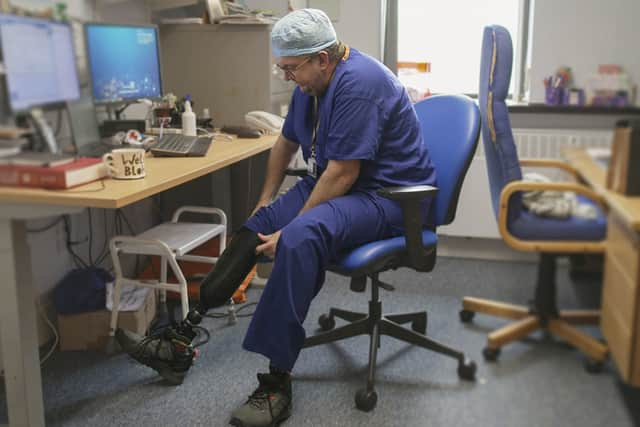Amputation surgeon who lost both his legs to sepsis is shortlisted to become world’s first disabled astronaut
and live on Freeview channel 276
An amputation surgeon, who himself lost both his legs to sepsis, has been shortlisted to go into space as the world’s first para-astronaut. Dr Neil Hopper had both his legs amputated in 2019 and is now shortlisted for the European Space Agency’s search for a disabled astronaut.
Working as a consultant vascular surgeon at the Royal Cornwall Hospital Trust, Dr Hopper has performed hundreds of limb amputations in his career. But after suffering from sepsis and losing his toes and most of the skin under his feet, the surgeon had his legs amputated.
Advertisement
Hide AdAdvertisement
Hide AdWelsh-speaking medic features in the new Welsh-language BBC iPlayer and S4C documentary Drych: Camau Tua’r Sêr, which premiered last week (February 26). The documentary follows him on his progress heading to space as the ESA’s second disabled person to travel to space, after John McFall last November.
Dr Hopper, who is now a Senior Clinical Lecturer at the University of Exeter, said: "When I saw the advertisement from the European Space Agency for a para astronaut, I had to put in an application.
"The criteria were quite specific; you had to have a doctorate in engineering or medicine, you had to have a disability below the knee, and you had to speak a second language - hey, Welsh At first my wife Rachel thought I was completely crazy.”
Since losing his legs, Dr Hopper was advised to change career, but has since made great contributions to the field of amputation. Talking about his experience, hesaid: "I remember imagining the operation – operations which I do all the time, and thinking that power tools were going to be used on me. That was really difficult to process.
Advertisement
Hide AdAdvertisement
Hide Ad“I was in hospital for about six or seven weeks. The physical changes in my body were fairly easy to understand, but what I didn’t understand were the psychological changes and how hard it was just to fit back into family life.
A turning point in hislife came when he began to use his prosthetic legs. "I was starting to think I’d never be able to go back to work, I’d never be able to play football with my son, walk the dog on the beach - that’s the kind of mindset I had.


"But once I got legs, things started to change overnight, the future didn’t look so bleak. I was determined to go back to work. I wanted to prove that they were completely wrong.
"Throughout my career I’d always tried to imagine what it was like to have an amputation, so I didn’t expect to get the answer. I didn’t think I’d get the chance to see what it’s like on the other side of the knife. My experience has made me think more about how I communicate with patients. I believe it has made me a better doctor.”
Comment Guidelines
National World encourages reader discussion on our stories. User feedback, insights and back-and-forth exchanges add a rich layer of context to reporting. Please review our Community Guidelines before commenting.
